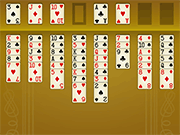
Logical Dominos Game Online - Play Free Logical Dominoes Board Game
Get ready to dive into Logical Dominos, an addictive online game that challenges your spatial reasoning and quick thinking! In this captivating puzzle, you'll tackle a grid of interlocked domino pieces, each hidden from view with their separating lines obscured. Your goal? Unravel and separate each piece before the clock runs out! Identify and restore the original shapes by matching pairs - successfully revealing them will highlight your progress. Clear each level by accurately sorting all the pieces and watch the board transform. Are you up for the challenge? Dive in, solve the puzzle, and have a blast with Logical Dominos!
11,698 play times
How to Play Logical Dominos Game
Use your mouse or touch the screen on touch devices. Drag to play or left click on the first half of assumed domino piece and release the button only when the cursor is on the second half. The logical dominoes represent a puzzle you will have to resolve in two minutes. The domino chips are deprived of the separating line are put on the board in a form of a rectangle. You have to restore the original chips of form new ones. For that you should left click on the first half of the assumed chip and release the button only when the cursor is on the second half. If you are right with the chop and there are no more chips on the board identical to it then it appears on the board.
The Dominos Board Game dates back to the Song Dynasty China
Tile games have been found in China as early as 1120 CE. Some historical accounts have traced evidence of the existence of the pieces, way back to a soldier-hero named Hung Ming (181-234 CE). Other historians believe that Keung T'ai Kung, in the twelfth century BCE had created them. The earliest mention of dominoes that we know about is from Song Dynasty China, found in the text Former Events in Wulin. The first traces of Dominoes in Europe dates back to the 18th Century in Italy. Although domino tiles are clearly of Chinese inheritance, there is a debate over whether the European tile set came from China to Europe in the fourteenth century or was invented independently. European dominoes are rectangles that are twice as long as they are wide. There is a single tile for each combination of the faces of a pair of dice; the blank suit is the throws of a single die, for a total of twenty-eight tiles in the standard Double six set. Other sets with larger numbers of tiles were invented later, with the double nine and Double twelve sets being the most common extensions. The word domino is most likely to be derived from the Latin, dominus (ie. the master of the house).







